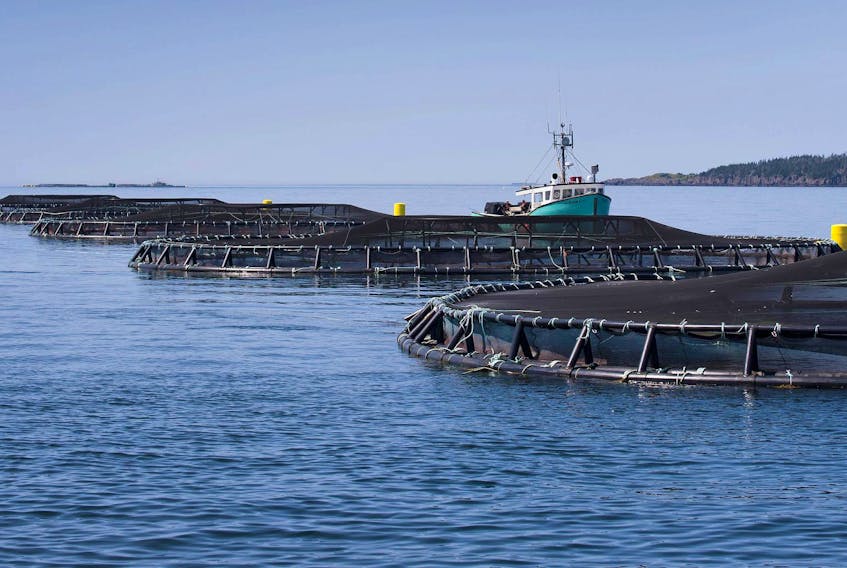I wish to disagree with NLCAR’s opinion (the Newfoundland and Labrador Coalition for Aquaculture Reform) in their letter to the editor entitled “Open-net pen aquaculture is a failed technology,” in The Telegram, Aug. 3.
In fact, net-pen aquaculture continues to grow in our province and globally in over 100 countries, for marine finfish, including Atlantic salmon. And it will continue to grow as solutions for farming finfish in contained net-pens or similar ocean structures are found to minimize and mitigate the impacts that are referred to by the critics of ocean seafood farming (pests, deposits, escapes included). Good science and innovation in technology are at the forefront of these solutions.
In our own province, I know that Memorial University’s training and research units continue to play a major role in assisting net–pen fish farming in finding the solutions to the issues that have plagued this growing sector of our seafood production. The first trials were initiated in the 1970s and have continued to this day. The results are promising: We have a $300 million per year rural economic engine, employing nearly 2,000 Newfoundlanders and Labradorians in sustainable seafood farming and services, supporting their families in dozens of rural regions of the province. And, there is promise of doubling this or more in the next 10-15 years.
I have been fortunate as a “civil servant” (as put by NLCAR) to have played a very small role in being able to assist this growing sector of our economy, in finding solutions. I would think it is my responsibility, as an academic and educator, to do so. If you could see the pride and sparkles in people’s eyes in these areas in producing a healthy, environmentally and socially sustainable food product, with a great demand, while being able to remain in their home Province, raise their families, and contribute in excess of $100 million in GDP per year (taxes included), I think you would agree. For details on MUN’s contributions to the NL aquaculture sector, I refer you to our recent chapter on sustainable aquaculture in the “Food Futures” book, edited by C. Keske, and published by ISER, Memorial University.
Net-pen farming technology for salmonids and other marine finfish has been supported by every provincial and federal government in Canada since the 1960s, regardless of political stripe. Globally, it is supported by well over 100 jurisdictions in as many countries. So, I would disagree that it is a “failed technology,” rather it is a “growing and innovative technology,” that is adapting to environmental challenges that it poses.
The critics of net-pen seafood farming maintain that recirculating aquaculture systems (RAS) are the future of seafood farming, and the only solution for Atlantic salmon farming. I don’t believe anyone would disagree that land-based RAS systems will continue innovate and to provide one form of much needed seafood. Certainly not I. We need all types of seafood farming to meet market demands for healthy, nutritious and environmentally responsible foods. In fact, Atlantic salmon net-pen farmers have been using RAS technology since the 1980s and major improvements have been made in the past 40 years. However, that the technology is ripe to produce 10,000’s of tonnes to meet a global market or even a country market of a million tonnes or more of ocean farmed seafood, well it’s just not there yet.
Current on-land RAS systems account for less than one per cent of the farmed Atlantic salmon produced. As advances are made, through trial and error, land-based production of seafood will continue to grow, as will ocean production in net-pens. Atlantic salmon are particularly difficult to rear in large scale on land, and successes in bringing this species to market in an environmentally sound and economically viable, sustainable business have been few and far in between thus far, in spite of 30 years or more in development. Being an academic and researcher that follows seafood farming developments on land, the readers might be interested to know that in fact Memorial was one of the first, if not the first, to publish on the first RAS Atlantic salmon trials (I was a co-author on that paper in 1983).
I look forward to future developments in both land-based and ocean-based seafood developments over the coming years, in supplying healthy, nutritious, environmentally and socially responsible seafood to the world.
Yours in responsible seafood farming,
Cyr Couturier,
Aquaculture Scientist,
Marine Institute of Memorial University
RELATED:









